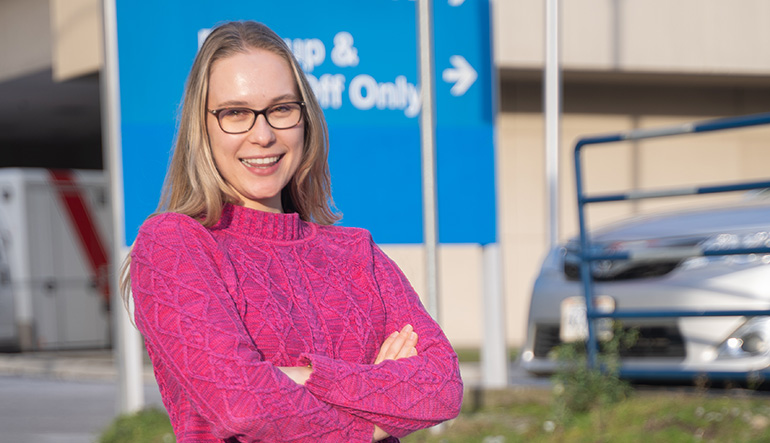
The new research institute is designed to bridge the gap between health care, science, innovation and research.
Doctoral student Marlena Ornowska remembers the 2017 lecture at Simon Fraser University (SFU) that sparked her passion for research. It was led by Dr. Steve Reynolds, an intensive care unit physician and respected researcher at Royal Columbian Hospital, whose passion for using research to improve patient care sparked Marlena's drive to follow a similar path.

Photo: Doctoral student Marlena Ornowska at Royal Columbian Hospital.
“Dr. Reynolds explained the real-word impact of research; how it directly benefits patients and isn’t just something that happens in a lab,” says Marlena. Fast forward six years and the Biomedical Physiology student and Fraser Health researcher is finishing her PhD by contributing to a clinical trial exploring ways of preventing hospital acquired infections from central lines.
Embedding doctoral and post-doctoral researchers like Marlena in health care settings is a win-win situation, providing relevant training for the health care professionals of tomorrow, research opportunities for Fraser Health clinicians and access to new treatments for patients.
Increasing research opportunities and integrating education and research into practice will occur more seamlessly with the new SFU-FH Health Research Institute (SFHRI).
The Institute will be established over the next five years to focus on research that improves patient care and staff and medical staff safety and well-being. It will tackle complex challenges including climate resilience in health systems, equity in care for underserved populations, seniors care and mental health and substance use.
“By partnering with SFU, Fraser Health gains research capacity and expertise on topics that matter most to the people who live and work in the region,” says Kate Keetch, director of the department of Evaluation and Research Services, Fraser Health. “I anticipate SFHRI will further elevate research including clinical trials, health systems and services research and community-based initiatives focused on our diverse population.”
Four Fraser Health representatives will sit on the Executive Committee of the Institute. Patients, advocates, family members and community members will form an advisory committee to provide input and evaluate its activities and progress.
“This is a really exciting opportunity that will ultimately benefit clinicians and communities across Fraser Health,” says Carolyn Sparrey, associate professor, SFU, and director, SFHRI. “There is a huge amount of health expertise at both institutions and this institute will help bring that talent together to support community-engaged research.”
The Institute will establish programs and scholarships to attract and empower students like Marlena, who is learning and researching in a clinical environment. “Seeing what patients are going through at Royal Columbian Hospital makes my work more tangible and keeps me motivated,” Marlena adds.
SFU and Fraser Health have a history of collaboration and are partnering on SFU’s new School of Medicine, along with the First Nations Health Authority, which is due to open in 2026.
The two institutions are also working together on an SFU core facility in Surrey Memorial Hospital, the ImageTech Lab, a leading medical imaging research facility and the first lab of its kind in Western Canada.
SFU is providing $75,000 in seed funding for the new research institute, with grant opportunities and philanthropic funding to be explored as the Institute evolves over the coming years.
